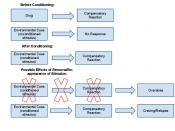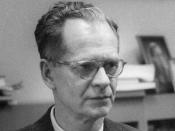Learning Personality theories focus on human interaction with their environment and how personality can be modified through changes in behavior. B.F. Skinner proposed a Personality theory based on his Behavioral Analysis theories. Social Cognitive theory was created by Albert Bandura. This theory states that reactions to events are more influential than the events themselves. Julian Rotter and Walter Mischel formed the cognitive social learning theory. This theory assumes that people react to their environment based, in part, on cognitive factors (Feist & Feist, 2006). Each of these explains personality in terms of how humans react and adapt to their environment. Learning personality theories have an effect on individual personalities and an influence on human interactions.
Theory of Behavioral AnalysisThe theory of behavioral analysis is based on the ideas of B.F. Skinner. Skinner separated his behavioral analysis theory from the highly speculative psychodynamic theories and focused almost entirely on observable behavior with minimal speculation (Feist & Feist, 2006).
He believed that personal behaviors such as thinking, remembering, and anticipating are all observable by the person experiencing them (Feist & Feist, 2006). Skinner's theory of behavior is based on the idea that learning is acquired through individual interaction with the environment. His method is also known as conditioning.
Skinner recognized two types of conditioning, classical and operant (Feist & Feist, 2006). With classical conditioning, a neutral (conditioned) stimulus is paired with-that is, immediately precedes- an unconditioned stimulus a number of times until the capability of bringing about a previously unconditioned response, now called the conditioned response, is achieved (Feist & Feist, 1996). Skinner believed that classical conditioning is part of the human learning process but that operant conditioning is responsible for learning most human behaviors. The key element in operant conditioning is the association made with the behavior and the consequence of...


